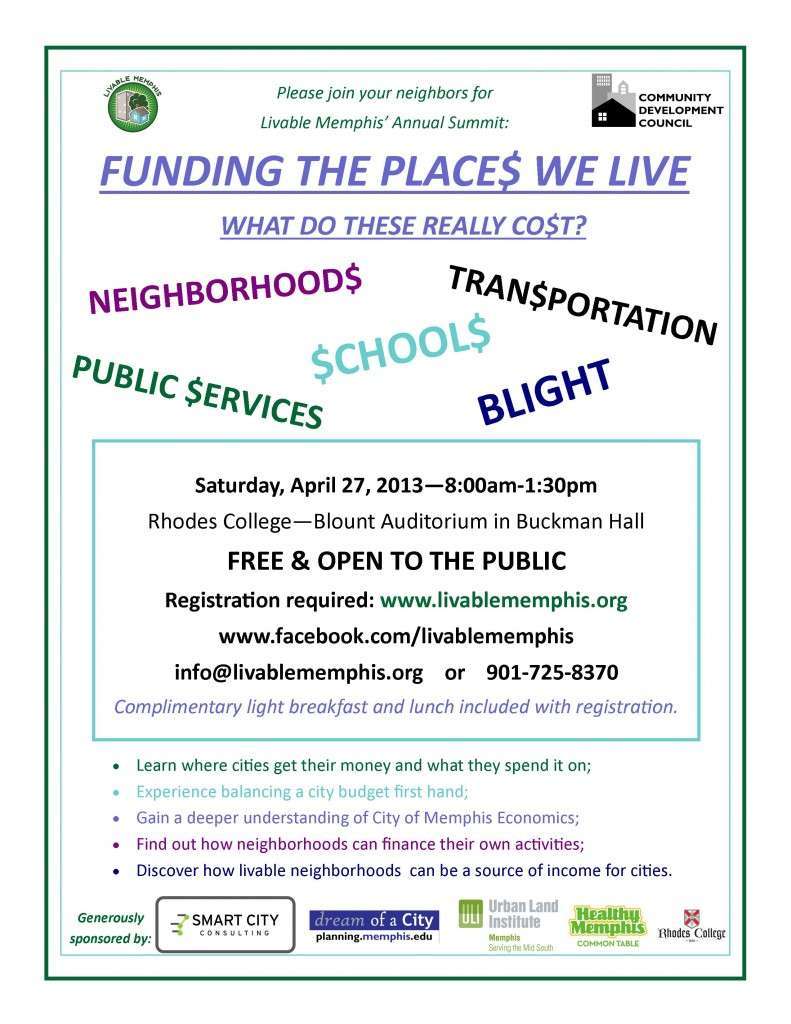Want to learn more about the resources it takes to run our city? Ever thought about how we can make budgeting more transparent and participatory? Discover where cities get their money and how they spend it.
In this era of tight fiscal restraints, Funding the Places We Live follows closely on the heels of City of Memphis Budget/Capital Improvement Program (CIP) discussions and public input sessions for the City of Memphis 5-Year Financial Strategic Plan.
At Funding the Places We Live participants will:
- Learn where cities get their money and what they spend it on;
- Experience balancing a city budget first hand;
- Gain a deeper understanding of City of Memphis Economics;
- Find out how neighborhoods can finance their own activities;
- Discover how making neighborhoods more livable can be a source of income for cities.
When: Saturday April 27
Time: 8:00am-1pm (followed by an optional complimentary lunch)
FREE and open to the public, Registration required.
Where: Rhodes College – Blount Auditorium in Buckman Hall
To register: info@livablememphis.org, 901-725-8370, www.livablememphis.org
Here’s the agenda:
Livable Memphis Summit 2013 Agenda
8:00am Registration/Coffee
8:30am Welcome/Introduction:
City Budgeting 101 – A comprehensive overview of how cities are funded. Topics include: sources of funds, pie chart of expenses, property tax as public revenue, privatization, reliance on sales tax, local matches for federal dollars, City budget timeline and procedure, how to view and read the City budget online, transparency in other cities, budget public input in other places, opportunities for new revenue, identifying and updating broken funding mechanisms (parking tickets, fines and fees, blighted properties).
Break Out Sessions:
9:00-9:45am (followed by a 15 minute coffee break)
1. City Budget Game – Think balancing the budget is easy? YOU try it! In this breakout session, participants will role play government department heads and try to balance New York City’s budget. (May also incorporate Tom’s game/putting people in the place of City Council)
2. Funding our Schools – A comprehensive look at the current funding formula for our public schools. This breakout will include a conversation about the challenges to adequately funding educational institutions, the fiscal implications of the school merger, and more. Q & A
3. Thicker Waistlines, Thinner Wallets – Our auto-centric lifestyles create enormous strain on our bodies and wallets. Adult and childhood asthma, obesity, diabetes and heart disease are very expensive to our communities. Our public infrastructure investments discourage healthy lifestyle choices. How are your local tax dollars spent on public health? What are the negative health impact demographics for Memphis? How does the built environment affect health outcomes? How can we do things differently to benefit our bodies and our wallets?
10:00-10:45am (followed by a 15 minute coffee break)
4. City Budget Game (REPEAT)
5. Funding Your Neighborhood – Find out how neighborhoods are resourceful at funding their own activities. How do Neighborhood Associations raise funds for activities? What do they spend it on? How can you organize a fundraising effort for your neighborhood? What grant resources are out there for communities to make their neighborhoods more livable (Home Depot grants, DMC grants, 501c3 filing, etc)?
6. Cashing-in on Public Investments – We have lots to learn from our past public investments. Take a closer look at the relationship between annexation, land productivity, and today’s investments. Have our annexations paid for themselves? What properties are paying for themselves and what properties are draining our resources? Can we strategically reinvest to leverage what is working?
11:00-11:45am (followed by a 15 minute coffee break)
7. The Price of Public Services – This panel discussion will shed light on the fiscal reality our public services. How much do these services cost? Where do their funds come from? What is the decision making process for how the funds are spent? What kind of city do we want to pay for?
8. The REAL Cost of Blight – Take a closer look at the true cost of blighted properties on our neighborhoods. One vacant and blighted property is a huge fiscal liability: it reduces adjacent property values and it cost the City in fire, police and code enforcement. What are the barriers to fixing our blight problem (delinquent taxes and redemption periods)? What innovative solutions can get these properties redeveloped and back into property tax revenue for the City and County?
9. What is Economic Development Worth? – Are large scale economic development projects working for Memphis (think: Bass Pro)? Who makes these decisions? What do they cost the community and what are the paybacks? What are the economic development tools the City uses to incentivize new business? Are our efforts a “race to the bottom”? What are some “economic gardening” best practices that other places are using to growth their own businesses? Are we investing in Innovation as an economic development tool?
12:00-12:45pm Keynote Address: HOW ARE OTHER PLACES DOING IT? Director of Public Fiscal Management, INC., David Eichenthal helps cities to better serve their communities through budget management. He will highlight how other places make their budgeting transparent while engaging citizens in the decision making process. He will share insights on how Memphis and Shelby County might learn from these best practices.
1:00-2:00pm Lunch in Rhodes College Dining Hall.



